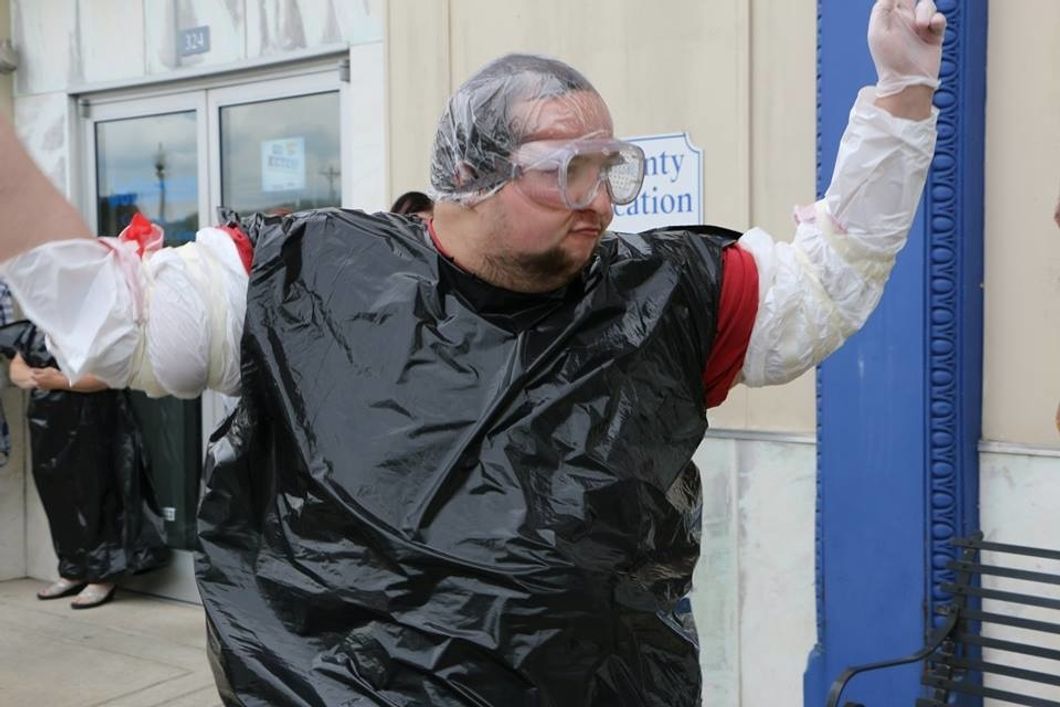Are You Ready for Life After College Sports?
We grow up playing sports, and some of us give our all to "make it." What happens when we don't?
College athletics is one of the last stepping stones before entering the world of professional sports. Collegiate athletes spend a majority of their college career training and competing in addition to the countless hours given prior to their recruitment. According to research by the National Collegiate Athletic Association (NCAA) in 2015, Division I college athletes dedicated thirty-four hours a week to their sport. Assuming seven hours of sleep per night, that's roughly 28 percent of their weekly activity comprised of practice and competition.
Even the rest of their time outside of practice is regimented, controlled, and planned so they can stay healthy, uninjured, study, and be successful. Although this method helps the college athletes proceed to professional sports, most will not be recruited and need to be prepared for life outside of organized athletics.
The NCAA gathered more research in 2016, and found that 1 to 1.5 percent of collegiate athletes proceeded to play professionally while the majority transitioned into a life that did not revolve around their athletic talents. Transitions can be difficult regardless of when or where they occur, but they can prove especially challenging to those that are accustomed to a competitive lifestyle. These transitions can cause stress, health problems, and leave the collegiate athlete mentally and physically unprepared for life outside of sports.
Fortunately, the skills that student-athletes strengthen on the field won't go to waste once they graduate. The dedication, integrity, and perseverance learned from years of competition will benefit them in the professional world. Here are a few tips that can help athletes ease into a transition and find satisfaction outside of their sport. These tips are not only meant for the athlete, but for friends, family, and coaching staff that should be aware of the transition challenges and how to help.
Plan in advance
This is advice that can only be beneficial when applied earlier, rather than later. Formulating a contingency plan is more than helpful, it is necessary. Due to the clearly unbalanced statistics reflecting college athletes who will not go professional, preparing for a future outside of athletics will ease the transition and offer viable career options.
The plan consists of multiple parts, one of which is being a good student. Athletics may be responsible for the scholarships and opportunities a student-athlete has, but academics are truly the heart of a college or university. Finding an educational passion is important for establishing future career options, by studying diligently and actively participating in classes, a student-athlete can warrant success in their educational career, as well as their professional career after graduation. By using the resources available, both in academic and athletic departments, student-athletes can gain advantages when looking for references when they enter the professional world.
Another piece of the plan for student-athletes is to participate in activities outside of their sport. Trying new things can open up new ideas, passions, and growth. In short, learning to be flexible and open to new activities outside of athletics can help athletes be more accepting of life after sports.
Eat healthy
Athletes post-college may find it challenging to maintain a healthy diet. Their time in school and competing usually incorporates rigorous physical activity and a semi controlled diet, meaning they might not be able to implement their own diet. One of the harder aspects is transitioning from a very active lifestyle to one that is less active, making diet even more important.
As activity level decreases and athletes age, they need to properly adjust how they eat or suffer from possible health consequences. People are affected by the food they eat, and some foods beget poor health and a more sedentary lifestyle. In transitions, these foods should be avoided in order to stay upbeat and active.
Athletes don't need to make radical changes, but simply be more aware of portion sizes, fiber, and the kind of foods they eat. Vegetables and greens are always part of a balanced diet, and hydration is crucial to maintaining health. Staying hydrated is important in athletics, and being mindful of hydration when they are not being reminded to drink water will help as they learn to sustain themselves.
Be able to manage your stress
Transitional periods often cause stress, which is almost always detrimental to mental and physical health. Stress can be a positive tool that helps performance under pressure, but long periods of stress that aren't focused into an activity or goal can result in visible health issues.
Stress can be associated with higher blood pressure, a weaker immune system, higher chances of stroke or heart attack, infertility, premature aging, sleeping issues, anxiety, and obesity. Each of these possibilities should be taken seriously, and can be stopped through stress management. Some proven techniques are staying positive, breathing, exercise, and seeking professional help.
Positivity can be attained even when it seems out of reach. Former college athletes can focus on staying positive through words of affirmation and being mindful of their emotional state. Slow, deep breathing can lower the heart rate, slow down thoughts, and help put everything in perspective when tasks seem daunting. Exercise and seeking help from a therapist will keep both the body and mind healthy. Basically, discovering and maintaining a balance can help manage stress..
Athletes who no longer participate in sports do not have to say goodbye to a happy and satisfying life. The skills and abilities gained over years of athletic practice usually can transition with them into a new field. Competition, hard work, integrity, and perseverance can be beneficial in any field; it's up to the athlete to keep an open mind and be an active part in a successful transition.































































7 Small Things you Only Understand When You come From A HUGE Family
It's all fun and games until your friendly game of "rock, paper, scissors" becomes full-blown WWE.
I come from a big family, on both my mom's side and my dad's. We typically are around my mom's family, though, which makes my dad's side look small. Either way, my family is big. By "big family", I mean that a typical Sunday dinner consists of about 30 people. My home church is practically just my family. Family vacation is over 40 of us sharing a beach house. We are a very big, very close family, and it can be pretty great. It can be a terrible thing, too. Anyway, here are seven pros and cons of growing up within a 20-minute radius of your whole family.
We are always together.
Everyone likes their alone-time, but my family is no stranger to "alone-time" consisting of five other people in the same room. It is honestly a great thing—we're all extremely close and always have someone to lean on when times get rough. There are, however, some downfalls to never having two minutes without a cousin breathing down your neck. I'm pretty sure it's impossible to be around someone all the time without wanting to strangle them a time or two... Or twenty.
There is no such thing as a secret.
Clearly, secrets aren't always a good thing. If a person in the family is having some issues with a friend or is in a bad relationship, the whole family knows and wants to do what they can to help. That's good and all—except for the fact that there aren't any secrets AT ALL. You honestly cannot make one mistake without everyone acting like they are your parent, telling you what you should have done instead.
All your cousins are your best friends.
Growing up around your family, you get extremely close with your cousins. A lot of times, they end up going to the same school as you. This means that you start out your school career with someone you know. You can grow your friend group and all be best friends and it will be great. However, if you're as unlucky as me, nobody else decided to have kids around the time your mom did. That led to you being the awkward cousin who didn't really fit in with the older group or the younger group. That, then, leads to a very socially awkward child/adult (AKA, me).
You're never alone.
Sometimes, you just need a shoulder to cry on when you have a bad day, a bad break up, or even just want to complain. Being in a big family means that there is always someone to help you get through your feels and get to a better mood. What doesn't work is when you just want to be alone and your family won't let that happen. I mean, yes, a "How are you?" text is nice, but if it's literally 20 texts every 10 minutes, it gets kind of old. That just leads to you being sad and annoyed.
Everyone has advice to give.
In a big family, there will always be someone older than you or someone who has gone through what you're currently going through. It makes it extremely nice because they can stop you from making some seriously poor life choices. Everyone wants to give you a helping hand and you can really feel the love. Sometimes, though, the advice is given when completely unnecessary and unwanted. Like, OK, Cheryl. I understand that tattoos are permanent, but so is the botched Botox you got last year.
There is always AMAZING food.
In big families, everyone is always finding new recipes—from dill pickle soup to "better than sex" cake, we are always trying something new. It's always a great time! It really is. Until you're 25 pounds heavier and struggling to fit into your fat pants. So, yeah, dipping chocolate graham crackers in a dip that taste like cookie dough is a great idea in theory, but when you have someone walk up to you asking when your due date is, you start to reconsider.
There is never a dull moment.
When your whole family can be at your house before you can finish an episode of "Family Guy", you know that they are down for any fun activities. Whether it be a spontaneous game night or a bonfire and hot dogs, a big family is always down to get together. It makes for a great time when you are bored on a Friday night, but sometimes you'll be home on a Tuesday and your whole family will come piling in with 18 movies, 12 games, and 10 bottles of wine. And you work at 9 A.M. the next morning.